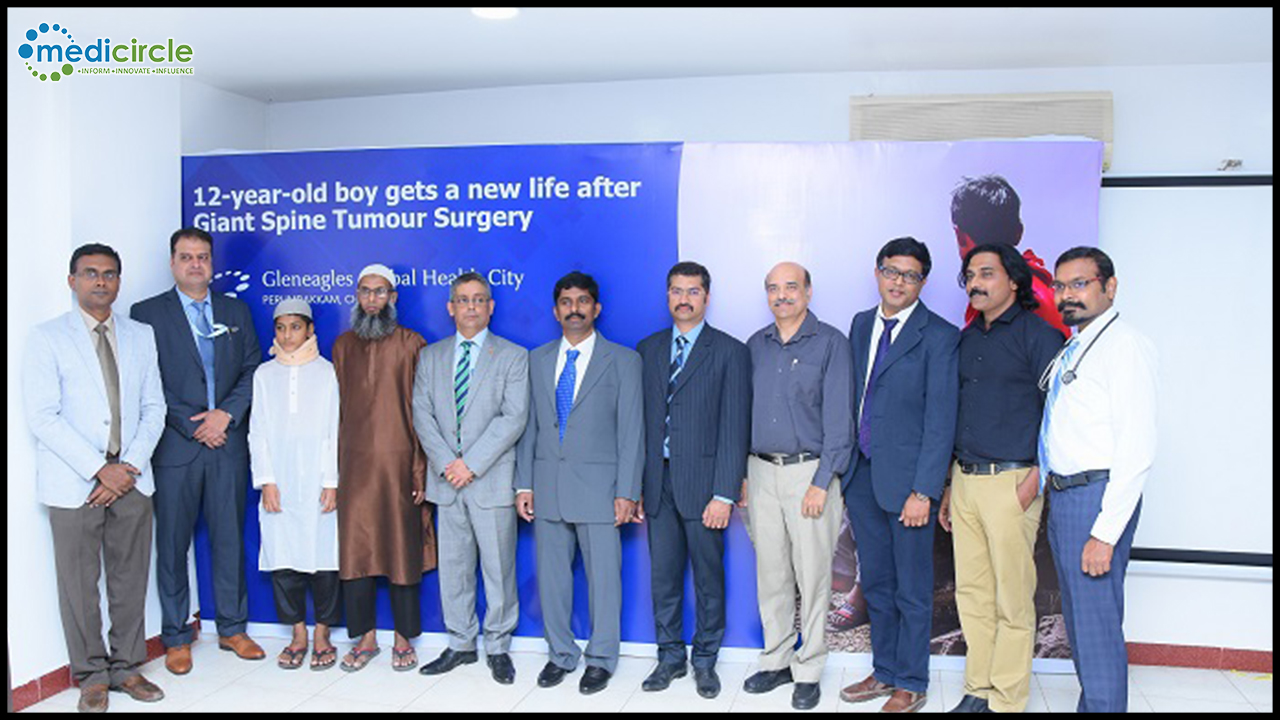Abdul Aleem (name changed), a 12-year-old boy from Bangladesh was diagnosed with a giant nerve sheath tumour measuring 15X15X20 cms covering the entire lower part of the neck. The giant tumour was removed successfully in a 12-hour marathon single-stage surgery by a team of top neurosurgeons at Gleneagles Global Health City, Chennai, the largest facility of Gleneagles Global Hospitals network in India.
The boy’s condition was very critical as the tumour was extending into the left side of the neck and chest cavity.
Abdul visited the neurosurgery department with complaints of swelling on the left side of his neck above the collar bone which was growing backwards towards the cervical spine; he was in pain from the past two years. The tumour had completely destroyed the bones in the lower neck and the major blood vessels on the left side of the neck were encased and displaced by this large tumour. His reports confirmed that he needed urgent treatment for the giant nerve sheath tumour.
A multi-disciplinary team of doctors led by Dr Nigel Symss (Senior Consultant Neurosurgeon) along with Dr Phani Kiran S (Senior Consultant Spine Surgeon), Dr Rajkumar (Senior Consultant Vascular Surgeon), Dr Jagannath PM (Neurosurgeons), Dr Arul K (Neurosurgeons) and Dr Ramana (Neuro-Anaesthetist & Neuro-critical care) performed the surgery. After a complete examination and investigations of the boy, the doctors decided to remove the large tumour in a single-stage surgery.
Talking about the case, Dr Nigel Symss, Senior Consultant Neurosurgeon, Gleneagles Global Health City, said, “The advantage of single-stage surgery is less amount of blood loss, fewer chances of infection, avoiding a second surgery and a shorter hospital stay. These kinds of the tumours are a benign schwannoma and are slow-growing; if not diagnosed early may cause serious neurological deficits and instability of the spine. Giant dumbbell spinal schwannomas are uncommon lesions and their surgical treatment is demanding and challenging, requiring a multidisciplinary team approach for achieving the best functional recovery.”
The microsurgical excision of the tumour was performed using a microscope and CUSA. The nerves and major neck vessels around this tumour were delicately separated by the expert surgeons in a 12-hour long single-stage surgery.
Dr Rajkumar, Senior Consultant, Vascular Surgeon, Gleneagles Global Health City, said, “The surgery was so challenging that any damage to the blood vessels or nerves during the surgery would have led to a major stroke or paralysis to the boy.”
“The accepted treatment for these benign tumours is complete surgical resection where feasible, and where indicated, vertebral fixation,”, added Dr Phani Kiran, Senior Consultant, Spine Surgeon, Gleneagles Global Health City.
The tumour was removed completely and the destroyed part of the cervical spine was stabilized with titanium cage and plate with screws. Abdul is recovering well and undergoing physiotherapy and he has no new neurological deficits.

 The microsurgical excision of the tumour was performed using a microscope and CUSA. The nerves and major neck vessels around this tumour were delicately separated by the expert surgeons in a 12-hour long single-stage surgery.
The microsurgical excision of the tumour was performed using a microscope and CUSA. The nerves and major neck vessels around this tumour were delicately separated by the expert surgeons in a 12-hour long single-stage surgery.










.jpeg)



.jpg)





.jpeg)

.jpg)





.png)

